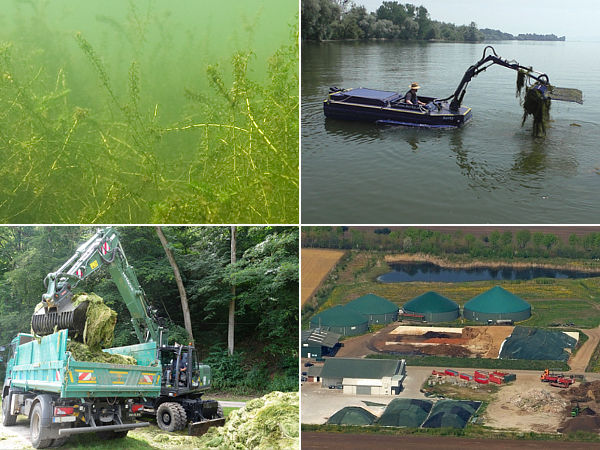AquaMak: Aquatic macrophytes – ecologically and economically optimized utilization
| Project Information | |||
|---|---|---|---|
| Project chair: | Prof. Dr. Willfried Nobel | ||
| Staff: | Dr. Markus Röhl (ILU) | ||
| Sandra Roth, Dipl.-Ing. (FH) (ILU) | |||
| Vasco Brummer, Dipl.-Landschaftsökologe (ISR) | |||
| Project partners: | Helmholtz Centre for Environmental Research (UFZ) – Centre for Environmental Biotechnology – Prof. Dr.-Ing. Andreas Zehnsdorf | ||
| German Biomass Research Center (DBFZ) – Dr. Walter Stinner | |||
| Nürtingen-Geislingen University (HfWU) – Institute for International Research on Sustainable Management and Renewable Energy (ISR) – Prof. Dr. Carsten Herbes | |||
| Duration: | 09/2014 bis 08/2017 | ||
| Funding: | Agency of Renewable Resources (FNR) of the Federal Ministry of Food and Agriculture (BMEL) by means of the Sondervermögen „Energie- und Klimafonds (EKF)“ |
Many rivers, canals and lakes in Germany are affected by the excessive growth of aquatic macrophytes. High inputs of nutrients and wide open spaces with high sunlight exposure provide favourable conditions for extreme growth of these aquatic plants. Some of them are not originally domestic (so-called neophytes) such as Elodea ssp. and cannot be regulated well within the local ecosystem. This leads to major impairments of water sports, recreational activities, energy generation from hydropower and flood protection. Water management authorities, municipalities and lake owners take on immense financial efforts to weed those waterbodies with machines such as weed boats. The resulting biomass is usually discarded.
A team of researchers from the Helmholtz Centre for Environmental Research (UFZ), the German Biomass Research Center (DBFZ), the Institute for International Research on Sustainable Management and Renewable Energy (ISR), and the Institute for Landscape and Environment (ILU) at Nürtingen-Geislingen University are currently investigating, whether those biogenic residues can be utilized for the production of energy in biogas plants.
The objectives of the AquaMak research project are:
- To estimate the amount of the biomass from water plants resulting from water body management and maintenance in Germany
- To test the usability of this biomass as substrate for biogas plants (biogas potential, practicable preservation through silage, amount of contraries such as sand)
- To evaluate different ways of biomass utilization according to economic, ecological and social criteria, and to identify the technical, organizational and regulatory framework for the energetic use of this biomass.
For further information on AquaMak, as well as publications and our newsletter, please visit the AquaMak website: www.ufz.de\aquamak
